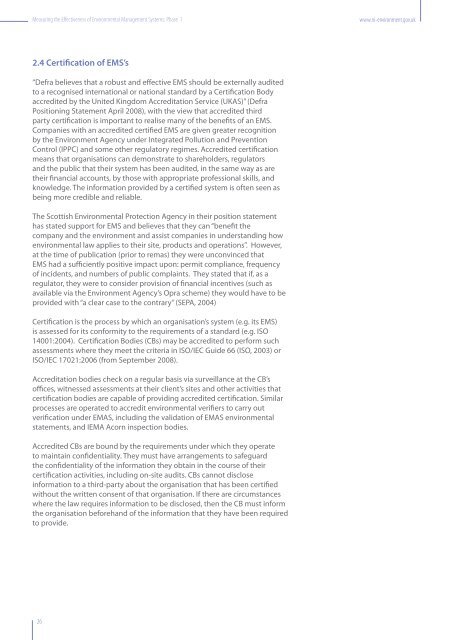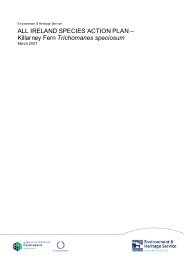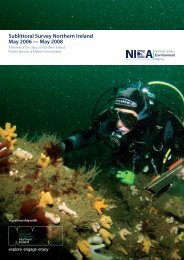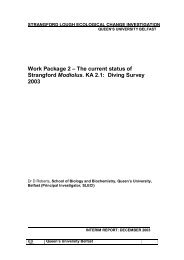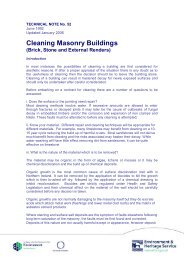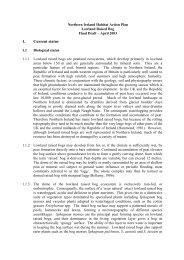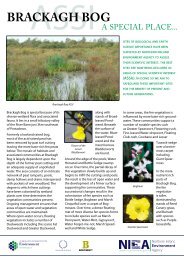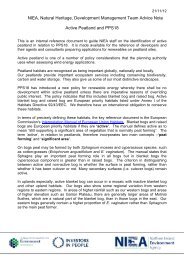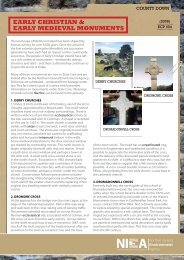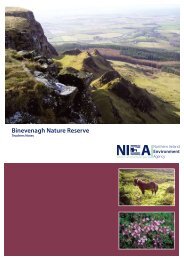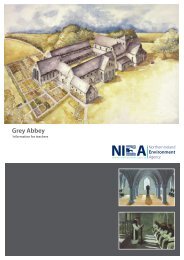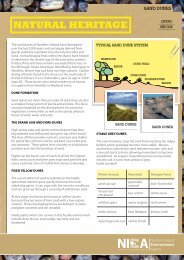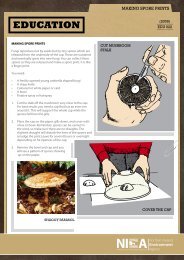Measuring the effectiveness of Environmental Management Systems
Measuring the effectiveness of Environmental Management Systems
Measuring the effectiveness of Environmental Management Systems
You also want an ePaper? Increase the reach of your titles
YUMPU automatically turns print PDFs into web optimized ePapers that Google loves.
<strong>Measuring</strong> <strong>the</strong> Effectiveness <strong>of</strong> <strong>Environmental</strong> <strong>Management</strong> <strong>Systems</strong>: Phase 1<br />
2.4 Certification <strong>of</strong> EMS’s<br />
“Defra believes that a robust and effective EMS should be externally audited<br />
to a recognised international or national standard by a Certification Body<br />
accredited by <strong>the</strong> United Kingdom Accreditation Service (UKAS)” (Defra<br />
Positioning Statement April 2008), with <strong>the</strong> view that accredited third<br />
party certification is important to realise many <strong>of</strong> <strong>the</strong> benefits <strong>of</strong> an EMS.<br />
Companies with an accredited certified EMS are given greater recognition<br />
by <strong>the</strong> Environment Agency under Integrated Pollution and Prevention<br />
Control (IPPC) and some o<strong>the</strong>r regulatory regimes. Accredited certification<br />
means that organisations can demonstrate to shareholders, regulators<br />
and <strong>the</strong> public that <strong>the</strong>ir system has been audited, in <strong>the</strong> same way as are<br />
<strong>the</strong>ir financial accounts, by those with appropriate pr<strong>of</strong>essional skills, and<br />
knowledge. The information provided by a certified system is <strong>of</strong>ten seen as<br />
being more credible and reliable.<br />
The Scottish <strong>Environmental</strong> Protection Agency in <strong>the</strong>ir position statement<br />
has stated support for EMS and believes that <strong>the</strong>y can “benefit <strong>the</strong><br />
company and <strong>the</strong> environment and assist companies in understanding how<br />
environmental law applies to <strong>the</strong>ir site, products and operations”. However,<br />
at <strong>the</strong> time <strong>of</strong> publication (prior to remas) <strong>the</strong>y were unconvinced that<br />
EMS had a sufficiently positive impact upon: permit compliance, frequency<br />
<strong>of</strong> incidents, and numbers <strong>of</strong> public complaints. They stated that if, as a<br />
regulator, <strong>the</strong>y were to consider provision <strong>of</strong> financial incentives (such as<br />
available via <strong>the</strong> Environment Agency’s Opra scheme) <strong>the</strong>y would have to be<br />
provided with “a clear case to <strong>the</strong> contrary” (SEPA, 2004)<br />
Certification is <strong>the</strong> process by which an organisation’s system (e.g. its EMS)<br />
is assessed for its conformity to <strong>the</strong> requirements <strong>of</strong> a standard (e.g. ISO<br />
14001:2004). Certification Bodies (CBs) may be accredited to perform such<br />
assessments where <strong>the</strong>y meet <strong>the</strong> criteria in ISO/IEC Guide 66 (ISO, 2003) or<br />
ISO/IEC 17021:2006 (from September 2008).<br />
Accreditation bodies check on a regular basis via surveillance at <strong>the</strong> CB’s<br />
<strong>of</strong>fices, witnessed assessments at <strong>the</strong>ir client’s sites and o<strong>the</strong>r activities that<br />
certification bodies are capable <strong>of</strong> providing accredited certification. Similar<br />
processes are operated to accredit environmental verifiers to carry out<br />
verification under EMAS, including <strong>the</strong> validation <strong>of</strong> EMAS environmental<br />
statements, and IEMA Acorn inspection bodies.<br />
Accredited CBs are bound by <strong>the</strong> requirements under which <strong>the</strong>y operate<br />
to maintain confidentiality. They must have arrangements to safeguard<br />
<strong>the</strong> confidentiality <strong>of</strong> <strong>the</strong> information <strong>the</strong>y obtain in <strong>the</strong> course <strong>of</strong> <strong>the</strong>ir<br />
certification activities, including on-site audits. CBs cannot disclose<br />
information to a third-party about <strong>the</strong> organisation that has been certified<br />
without <strong>the</strong> written consent <strong>of</strong> that organisation. If <strong>the</strong>re are circumstances<br />
where <strong>the</strong> law requires information to be disclosed, <strong>the</strong>n <strong>the</strong> CB must inform<br />
<strong>the</strong> organisation beforehand <strong>of</strong> <strong>the</strong> information that <strong>the</strong>y have been required<br />
to provide.<br />
26<br />
www.ni-environment.gov.uk


